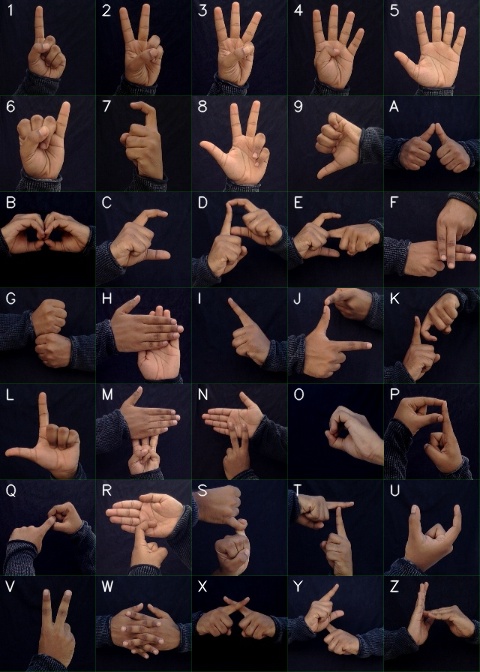Hello, This repository contains python implementation for recognising Indian sign language (ISL) gestures. As there is less research, there is no standard dataset avialable in the web. So, we decided to create my own dataset of gesture images. ISL dataset have all alphabets (A-Z) and numerics (1-9) with total classes = 35. Each class has 1200 images. ISL gestures are practically hard to recognise as two hands are involved and because of complexity. To classify images, Bag-of-words (bow) model has been implemented with SVM. 70:30 ratio has been used for train and test to split. Using this method, the model gives 99% accuracy approximatly with very less error rate.
All the gestures used in the dataset are in the shown below image with labels.
- python 2.7 (Does not work with upper versions as openCV does not support SURF features)
- opencv-python==3.4.2.16
- opencv-contrib-python==3.4.2.16
- numpy
- imutils
The implementation follows several steps:
i) Image segmentation (masking to get raw skin and edges in the image)
ii) SURF Feature detection (finding feature descriptors for all data)
iii) K-means clustering (Codebook generation: to cluster all features and to get visual words (bow))
iv) Histograms computation (Using visual words (bow) compute histograms for each image)
v) SVM model for classification (input: histograms, output: predection for testdata)
As the dataset images are much similar, the model has given with highest accurecy 99% with less error rate.
A demo can be watched here: https://youtu.be/8wj0D_wCf3g
Run files in order:
Step 1: (Optional) To create your own Dataset run
python image_capture.py
Step 2: If you want to use our dataset download from below and extract it in the root directory of the repository. Then run
python imagePreprocessing.py
to preprocess all the images (from raw images to histograms of bovw model) and to classify using SVM.
Step 3: To visualise the confusion matrix run the file
python visualise.py
Dataset can be downloaded from : https://drive.google.com/open?id=1keWr7-X8aR4YMotY2m8SlEHlyruDDdVi
- Inspired by the implementation of Rishab Guptha
- Bag of features model post by kaggle
- Implementing Bag of Visual words for Object Recognition post
- Bag of Visual Words(BoVW) by Aybüke Yalçıner post
https://www.iosrjournals.org/iosr-jce/papers/Vol22-issue3/Series-1/B2203011419.pdf
